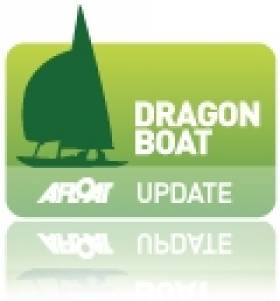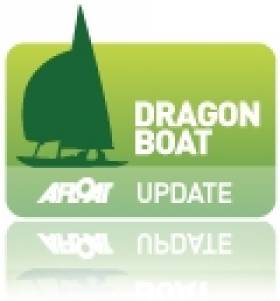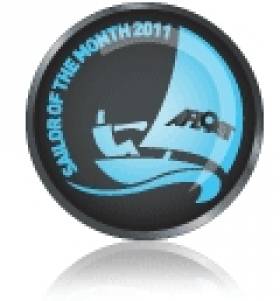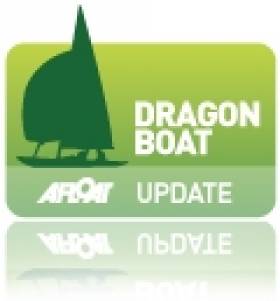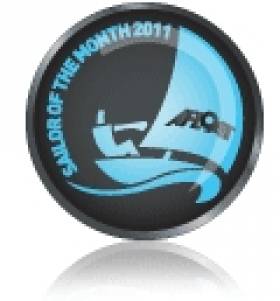Displaying items by tag: Martin
Byrne has it all to Play for in Last Race of Regates Royales
The penultimate days racing at Regates Royales yesterday saw Irish Dargon Jaguar skppered by Martin Byrne battle it out with their nearest competitors at the top of the 59 boat Dragon fleet. A 6th for Jaguar, the one time regatta leader, in race 6 leaves them in fourth overall with just two points separating the top four boats with one race to sail.
A superb win by the Italian team in very light conditions in the Bay of Cannes jumps them into the top spot tied on points with Poul Rickard Ho Jenson.
A tenth for the Russian team drops them to third just one point ahead of Jaguar. The second race of the day was abandoned at the half way point due to a disappearing breeze. Jaguar were lying in sixth position at this time well ahead of all three of their rivals and a finish under these circumstances would have left them comfortably in the lead overall.
It is all to play for in today's final race where the four leading contenders will be keeping a very close eye on each other with a winner takes all scenario.
Byrne Retains Irish Dragon Title at Kinsale
Martin Byrne retained his title as National Dragon Champion in Kinsale last weekend, adding to his Edinburgh Cup victory last month in Abersoch writes Tim Pearson.
Byrne, with crew Adam Winkelmann and Pedro Andrades, was pushed hard by Jay Bourke and Cameron Good throughout the four day event which saw a variety of testing conditions in a predominantly moderate to fresh southwesterly airflow.
On the Friday racing was conducted in a sea mist which reduced visibility at times to 200 metres and required the competitors to bring their navigational skills into play.
However, Race Officer Alan Crosbie, using the event as a dry run for the Gold Cup in September 2012, when around 80 Dragons are expected to compete in the waters off the Old Head, was master of the conditions and got the 7 race series off on time.
2012 will be a special year for Dragons in Ireland, and there is already much international interest in a veritable grand prix circuit which will start with the Edinburgh Cup In early July, move to Dublin for the Nationals and culminate in Kinsale with the Gold Cup.
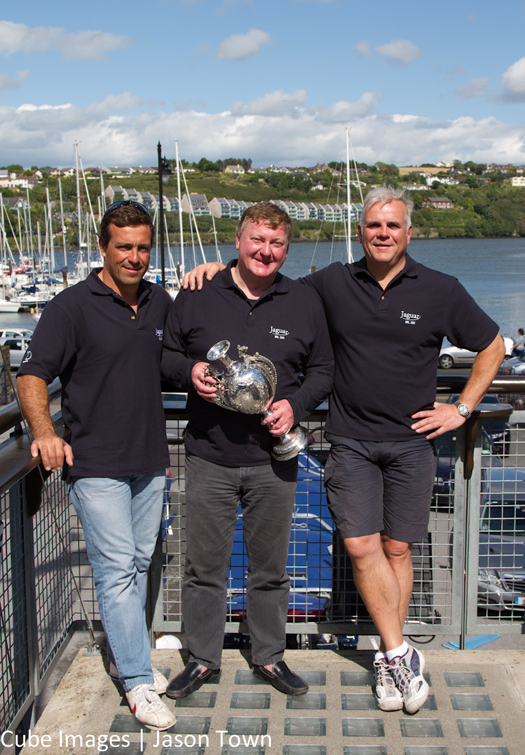
Irish Champions Martin Byrne, Adam Winklemann and Pedro Andrades
2011 Dragon Irish National Championships:
1. Martin Byrne
2. Jay Bourke
3. Cameron Good
Byrne Named July's Sailor of the Month
In a fleet of 44, including many of the world's top boats, he had already put together a solid series as the final day arrived in the excellent sailing waters off Abersoch in North Wales.
But whether or not he and his crew of Adam Winkelmann and Pedro Andrade came home with bronze, silver or gold, hinged entirely on that last race.
Sailing the immaculate Jaguar, he logged the kind of race that, for most skippers, is the stuff of dreams.
Jaguar emerged clear from the starting melee to such good effect that by mid-race she had a clear lead of 200 metres, a comfortable gap that enabled Byrne to keep effective cover on any challengers, such that the real race was for second place as Jaguar powered on to finish an extraordinary three minutes ahead.
It was textbook stuff. In his winner's speech, Martin Byrne said the secret of it all was the shoreside commander, his wife Triona, who looked after logistics and paperwork, and ensured everything ran smoothly all week.
Irish sailing needs more Trionas.
The Byrne win gives a boost towards 2012, which in Ireland will be the Year of the Dragon. The Edinburgh Cup will be on Belfast Lough from July 4-8, while the historic Gold Cup is in Kinsale from September 8-14.
Ireland has won a dozen Edinburgh Cups, the most prolific victor being Tony O'Gorman who won six times between 1975 and 1984.
But only once has the Gold Cup been brought home, in 1947, when it was won by Eric Strain of Belfast Lough. Robin Hennessy was in the frame in 1971 but didn't quite clinch it, so an Irish win is overdue.
And, with the Gold Cup scheduled for Ostende in September, maybe we won't have to wait until next year.
Royal St. George Trio Win Dragon Edinburgh Cup
Royal St. George Commodore Martin Byrne lifted the Dragon Edinburgh Cup in Abersoch, North Wales tonight after a three way last battle for victory went the Dun Laoghaire crew's way in emphatic style.
The current Irish champions won the pivotal final race by over three minutes in breezes touching 25-knots to become the latest holder of the Edinburgh Cup; the British National Championship.
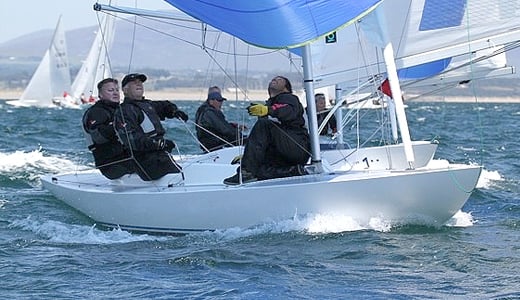
Martin Byrne steers to victory with crew Adam Winkelmann on spinnaker and Pedro Andrade. Photo: Fiona Brown
Celebrations will continue back in Dun Laoghaire tomorrow as the Dragon helmsman and his crew Adam Winkelmann and Portuguese sailmaker Pedro Andrade mark the significant victory that is a major shot in the arm for Irish Dragon sailing.
The 62-year old trophy is one of the most prestigious in the class along with the Gold Cup of this former Olympic keelboat. The 2012 Gold Cup is slated for Kinsale Yacht Club next year so the weekend win is a another fillip for the class here.
It all went down to the wire for the 43-strong fleet from Japan, Australia, Russia, Ireland and the UK on the final day of the 2011 Dragon Edinburgh Cup, supported by Aberdeen Asset Management, at the South Caernarvonshire Yacht Club in Abersoch. Going into the day Mikhail Muratov and Klaus Diederichs sailing with Irish Star keelboat pair Peter O'Leary and David Burrows were tied for the lead on 16 points, Martin Byrne was on 17 points, Julia Bailey counted 23 and Olga White 28. In the Corinthian fleet Richard Goodbody led Simon Brien by a single point with Patrick Gifford and Nigel Biggs both five points behind them.
There were four attempts at getting the final race, the sixth in the series, started including three under black flag. A total of six teams were disqualified including Olga White, whose hopes of making the podium were immediately dashed. Eventually at the fourth time of asking the fleet got away cleanly for what proved to be the best race of the series with the wind up at around 20 knots from the southwest and some nice big waves which made the runs pretty exciting.
Off the line Byrne got the best start at the committee boat end and was the first to tack off to the right with Diederichs and Muratov following. By the mid point Byrne had already established a lead with Diederichs and Muratov jostling for position on the front edge of the pack. Muratov went further right than Diederichs gaining a significant advantage at the top end of the course and as they rounded the first mark Byrne led with Muratov in fourth and Diederichs seventh.
As Diederichs and Muratove fought their way out of the pack, Byrne established control of the race and clearly had no intention of relinquishing it, gradually stretching away from the fleet. Behind him at the leeward mark Muratov rounded third with Diederichs on his tail in fourth.
On the second beat Byrne extended his lead to some 200 yards, Muratov moved into second and Diederichs third. They held their positions on the second run and up the final beat Byrne was able to maintain a loose cover on the fleet and cruise to a very well deserved victory. As Byrne was enjoying himself out front Muratov and Diederichs were still fighting it out. Meanwhile Simon Brien had been showing bursts of incredible speed to pull up through the fleet and as the fleet came on to the final beat he was challenging Muratov and Diederichs. Brien chose to work the middle whilst the other two went hard right and his move paid off. On the line Byrne and his team looked back to see Muratov finish second, Brien third and Diederichs fourth. Brien's nearest Corinthian challengers Nigel Biggs and Patrick Gifford crossed the line in fifth and thirteenth places.
Martin Breen is June's Sailor of the Month
It's the fourth time that a Galway boat has won the Dingle race, giving Galway Bay SC unrivalled status, as the race has only been sailed a total of ten times. It was launched as a biennial event in 1993, and back in the day it was Donal Morrissey et al who started the process with two wins with the GK 34 Joggernaut. Then Eamon Conneely took both line honours and the handicap win with his first TP52 Patches, and now Martin Breen has done the business with his recently-acquired Reflex 38, which raced to Dingle under the moniker of Galway Harbour.
A former army captain, Breen's progress up the ladder of sailing achievement has been steady. He first made his mark with a successful Sigma 33, then there was more west coast sailing silverware taken with a Corby 33, and now he has the first Irish-based Reflex 38.
A hands-on skipper, for the race to Dingle he beefed up his usual ship's complement of family and friends with Galway's own Aodhan Fitzgerald, who in turn brought in Neil Spain and Johnny Murphy who had been on the Fitzgerald crew which won the round Ireland race.
Galway Harbour sailed a perfect first stage down the Irish Sea to lead everything on the water at the Tuskar Rock. On the long drag race to the Fastnet in a backing and strengthening southerly, only the Open 40 Pride of Dalkey-Fuji got ahead of the Galway boat, which managed to hang in despite blowing out a spinnaker and getting a tear in the mainsail.
By the time they reached the Fastnet, with the wind still veering they were already beating, and it was a slug into the Atlantic up to the next turn at the Skellig rock. The final stage into Dingle almost became a spinnaker reach, which would have been a problem as they'd blown out their reaching spinnaker on the south coast, but the wind stayed nor'west just long enough to get them into port and a superb win with a little bit of luck and a lot of talent


























